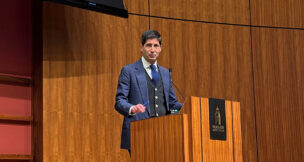
FILE- In this Oct. 29, 2014, file photo honoree Perry Sook, Chairman, President and CEO of Nexstar Broadcasting Group, attends the 24th Annual Broadcasting and Cable Hall of Fame Awards at the Waldorf-Astoria in New York. (Photo by Evan Agostini/Invision/AP, File)

FILE- In this Oct. 29, 2014, file photo honoree Perry Sook, Chairman, President and CEO of Nexstar Broadcasting Group, attends the 24th Annual Broadcasting and Cable Hall of Fame Awards at the Waldorf-Astoria in New York. (Photo by Evan Agostini/Invision/AP, File)
Nexstar Media Group buying Tegna in deal worth $6.2 billion
Nexstar Media Group is buying Tysons-based broadcast rival Tegna for $6.2 billion, which will help strengthen its local news offerings.
The transaction, if approved, will bring together two major players in U.S. television and the country’s local news landscape. Nexstar oversees more than 200 owned and partner stations in 116 markets nationwide today and also runs networks like The CW and NewsNation. Meanwhile, Tegna, which was formed in 2015 when Gannett Co. spun off its broadcasting and digital business, owns 64 television news stations across 51 markets.
“The initiatives being pursued by the Trump administration offer local broadcasters the opportunity to expand reach, level the playing field, and compete more effectively with the Big Tech and legacy Big Media companies that have unchecked reach and vast financial resources,” Nexstar Chairman and CEO Perry Sook said in a statement on Tuesday. “We believe Tegna represents the best option for Nexstar to act on this opportunity.”
Nexstar said Tuesday that the deal will also help it give advertisers a bigger variety of local and national broadcast and digital advertising options.
Nexstar will pay $22 in cash for each share of Tegna’s outstanding stock.
The deal could potentially help kick off even further consolidation in America’s broadcast industry. Nexstar, founded in 1996, has itself grow substantially with acquisitions over the latest two decades, becoming the biggest operator of local TV stations in the U.S. after it purchased Tribune Media back in 2019.
Nexstar’s purchase of Tegna also arrives amid wider regulatory shifts. Brendan Carr, the Trump-appointed chairman the Federal Communications Commission, which will need to give the transaction the green light, has long advocated for loosening industry restrictions. On Aug. 7, the FCC announced that it would be repealing 98 broadcast rules and requirements that it identified as “obsolete, outdated, or unnecessary.”
Some of those rules date back nearly 50 years, the FCC said, and apply to “old technology that is no longer used.” Carr maintained that such provisions no longer serve public interest.
In late July, the U.S. Court of Appeals for the Eighth Circuit also vacated the FCC’s “top four” rule, which has long prohibited ownership of more than one of the top four stations in a single market. The ruling is still subject to a monthslong assessment by the FCC, but could significantly clear the way for future mergers in the industry.
In company earnings calls held in early August, before Tegna and Nexstar publicly confirmed merger talks, both Tegna CEO Michael Steib and Nexstar’s Sook pointed directly to this ruling, and applauded Carr’s deregulation agenda as a whole.
“We believe that deregulation is necessary, important and coming,” Steib said in Tegna’s Aug. 7 call, noting that local broadcasters are “up against big tech competitors who have absolutely no encumbrances in how they compete.”
Beyond their core broadcast TV businesses, both Nexstar and Tegna also boast digital news, mobile app and streaming offerings, all of which have played key roles for the industry as consumers change the way they consume news and other entertainment.
Broadcast TV has been hit particularly hard by “cord-cutting,” with more and more households trading their cable or satellite subscriptions into content they can get via the internet.
The deal is expected to close by the second half of 2026. It still needs approval from Tegna shareholders.
Shares of Nexstar jumped 7.6% in premarket trading, and Tegna’s rose 4.3%.
















